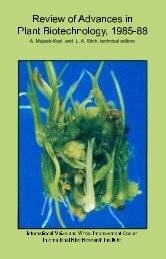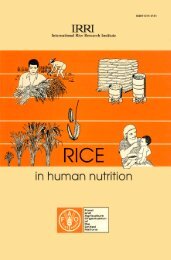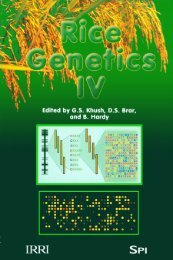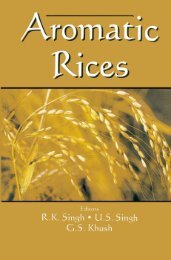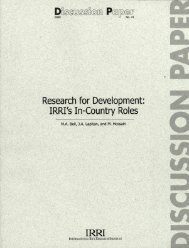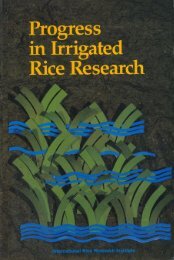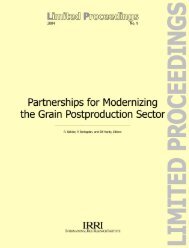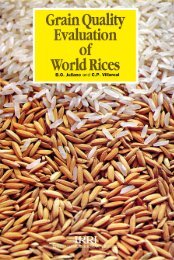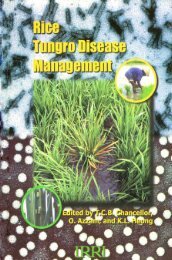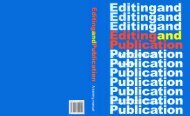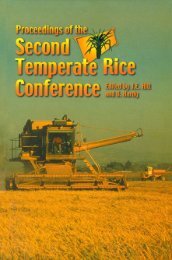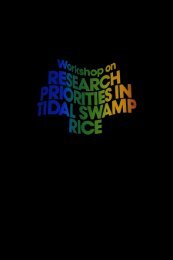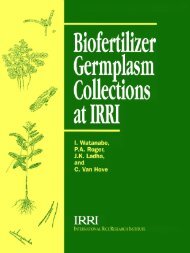An adventure in applied science - IRRI books - International Rice ...
An adventure in applied science - IRRI books - International Rice ...
An adventure in applied science - IRRI books - International Rice ...
- No tags were found...
Create successful ePaper yourself
Turn your PDF publications into a flip-book with our unique Google optimized e-Paper software.
4 History of the <strong>International</strong> <strong>Rice</strong> Research Institutesurvey dur<strong>in</strong>g an 18-month period beg<strong>in</strong>n<strong>in</strong>g <strong>in</strong> January 1955. For the first 8months of the study, I (as newly appo<strong>in</strong>ted assistant director <strong>in</strong> the AgriculturalSciences of the Rockefeller Foundation) accompanied Bradfield. Wevisited the pr<strong>in</strong>cipal agricultural colleges and experiment stations <strong>in</strong> thePhilipp<strong>in</strong>es, Japan, Taiwan, Thailand, Burma, Indonesia, India, and Pakistan.As a result, numerous grants were made for scientific equipment, for <strong>books</strong>and fellowships, and for specific research projects. This was the start of theRockefeller Foundation’s action program <strong>in</strong> agriculture <strong>in</strong> Asia.At the dose of the survey, Bradfield submitted a report on agriculresearchand education <strong>in</strong> Asia, <strong>in</strong>clud<strong>in</strong>g recommendations for activities thatthe Rockefeller Foundation might usefully support. He then returned toCornell University, and I handled the foundation‘s agricultural <strong>in</strong>terests <strong>in</strong>Asia. Contrary to persist<strong>in</strong>g belief, we did not travel <strong>in</strong> Asia to seek a site foran <strong>in</strong>ternational rice research <strong>in</strong>stitute. Indeed, before leav<strong>in</strong>g New York <strong>in</strong>early 1955, we had been <strong>in</strong>structed by the foundation not to explore further thepossible formation of such a center with Rockefeller Foundation support.THE FORD FOUNDATION ENTERS THE SCENEThe Rockefeller Board decision <strong>in</strong> 1954 had shelved the concept of an <strong>in</strong>ternationalrice research <strong>in</strong>stitute <strong>in</strong> Asia, for lack of f<strong>in</strong>ancial support. Fortunately,however, the Ford Foundation developed an <strong>in</strong>terest <strong>in</strong> the establishment ofthe proposed <strong>in</strong>stitute. The result was a comb<strong>in</strong>ed venture by the two foundations- one that was unprecedented. Its importance warrants an amount ofwhat led to it.For two weeks <strong>in</strong> October 1957, I journeyed <strong>in</strong> West Pakistan, talk<strong>in</strong>g withgovernment officials and with representatives of foreign assistance agenciesand visit<strong>in</strong>g educational and research <strong>in</strong>stitutions <strong>in</strong> the region. George F.Gant, Ford Foundation representative <strong>in</strong> Pakistan, traveled with me to assessvarious Pakistani <strong>in</strong>stitutions and programs, some of which already hadreceived assistance from either the Ford or the Rockefeller Foundation. Wediscussed the possibility of a jo<strong>in</strong>t effort by the two foundations to strengthenthe College of Agriculture <strong>in</strong> Lyallpur. Gant and I agreed that at some futuredate when he was <strong>in</strong> New York, arrangements would be made for officers ofthe two foundations to meet to discuss such a cooperative projectThe meet<strong>in</strong>g took place about 10 months later. Harrar and I were <strong>in</strong>vited tojo<strong>in</strong> a group of Ford Foundation officers for lunch at the Ford Foundation on18 August 1958 to discuss the possibility of a jo<strong>in</strong>t venture to strengthen theLyallpur <strong>in</strong>stitution. Present from the Ford Foundation were Forrest F. Hill,vice president for overseas development, George F. Gant, then programdirector for South and Southeast Asia, Alfred C. Wolf, program director forLat<strong>in</strong> America, and Walter Rudl<strong>in</strong>, program associate. After considerablediscussion, it was agreed to confer aga<strong>in</strong> on the matter at a later date.Toward the close of the meet<strong>in</strong>g, a conversation that would have farreach<strong>in</strong>gimplications took place. Turn<strong>in</strong>g to Harrar, Hill said, “You know,George, someone should undertake to work with rice the way you Rockefeller




